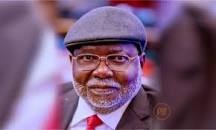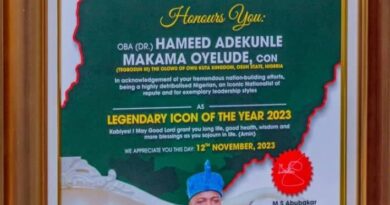Dr. Olisa Agbakoba, SAN, OON: Still An Amicus Curiae? By Dr. Akin Onigbinde, SAN
I ran into a video publication recently of learned senior counsel, a Life Bencher, former President of Nigeria Bar Association, and a national honours receipient, Dr. Olisa Agbakoba.

As the publication has not been disowned, I am wont to believe that it is not a creation of AI, but indeed, a genuine post by him.In that video publication, he passed a vote of no confidence on the Nigerian Judiciary as an institution.

He said that there was a time, when, on the basis of the facts and the law, a counsel could reasonably predict what the outcome of a legal dispute will be.
Today, he said, courts now give silly decisions, and he cited the case of the former Senate President, who tried to be President of Nigeria, participated in the primary election, and having lost the bid, went to seek for the senatorial position during the same election cycle, and when he won, his victory was affirmed by the Supreme Court. He described it as a most ridiculous decision which any person with a brain could have rendered, referring to the Supreme Court.
He also referred case of Imo State election petition appeal decision by the Supreme Court, in his word, where everything was turned upside down. He said he does not have the confidence he used to have in the Judiciary, especially, in the current adjudication of election petitions pending before the Judiciary of Nigeria including the Supreme Court.He said he could not say or forecast in which direction the decisions will go in the present election petitions and appeals before the Supreme Court.
He said he has the legal tools that should enable him to determine where the decision should go, but not being a member of the panel of the Court; but as a lawyer of 45 years’ experience, he was not sure if the court will see the pending litigations the way he sees them.Furthermore, being sub-judice he could not say what the outcome of the adjudication will be, and that the Supreme Court has become unpredictable.
He then went ahead to refer to the existence of a school of thought that now calls to question the constitutional finality and standing of decisions of the Supreme Court; and espoused the suggestion by the school that decisions of the Supreme Court should probably be referable forlegislative review. He concluded that today, the judgements of the Supreme Court no longer possess the confidence that it used to command.
The position taken and communicated by the learned senior counsel are weighty and deserving of interrogation on very many grounds.
First, this is an opinion from a very senior member of the Bar, a life Bencher, a silk and a former President of the Nigerian Bar Association.
This being the case, is the video medium the most efficacious means of ventilating whatever frustrations Dr. Agbakoba has about the Judiciary? Through his intervention in this video; he referred to the Judiciary, not to anyone individual, perhaps understandably. Is this perception and postulation a fair brush with which the entire Judiciary should be painted?
Did the learned senior counsel reflect on the full import, and consequences of such a pronouncement coming from a person like him sure to provoke on the legal profession, the judiciary, law and order in the entire society?
After enjoying 45 years of legal practice in the Nigerian legal practice space, it is now time to bring the house down, because the learned senior counsel perceives that the roof is now leaking!
Secondly, given his status, rank, years of practice as a lawyer and elder in the legal profession, is it the case that anyone within the profession, or the Judiciary would have refused to listen to his concerns if he had made efforts to register these?
Is it not open to Dr. Agbakoba to have shared his concerns with the stakeholders in the Justice sector, to take up these issues with the Judiciary at the highest levels? There has been instances in our life as a nation, where such concerns have been taken-up by bands of professional leaders who have sought to confront such challenges. The Patriot, is a group that readily comes to mind.
A more recent endeavor is that of the Justice Reform Project (JRP), a band of senior, respected, patriotic and very brilliant Nigerian lawyers, a crop of the nation’s finest and best. They also have very well articulated concerns about the justice sector of the nation.They have engaged the authorities of the Judicial system, including the Chief Justice of the Federation, who is also the Chairman of the National Judicial Council.
These engagements have ranged from robust interventions on subjects of concerns in the administration of justice across the nation, legal challenges in court; digitalization of court processes, publication of judgements on websites of courts, and very many other live concerns.These are professional, effective, patriotic, far-sighted approaches to the common challenges and concerns of the justice sector.
Dr. Agbakoba’s approach and publication smacks of a reckless, ill-considered and empty activism that cannot positively improve the judiciary as an institution What was the end-game and long-term objective of Dr. Agbakoba’s video address? Did he expect the disbandment of the Judiciary the morning after making the recording, or did he intend to put the consciences of the justices on a hook, or just to bring the institution to complete disrepute? National honours confer on receipients access to all levels of authorities in the country.
Why is Dr. Agbakoba not willing to appropriate all the channels available to him as a leader of the Bar, and a national icon to address his concerns? There is such a thing in the appellate court system which is recognized and often used by Courts called ‘amicus curiae’.
It is a Latin phrase for “friend of the court”. A non-party with an interest in the outcome of a pending lawsuit who argues or presents information in support of or against one of the parties to the lawsuit.
In many instances, the amicus curiae attempts to draw the court’s attention to arguments or information that the parties may not have presented, such as the effects of a particular court ruling on the interests of certain third parties.
An amicus curiae usually presents arguments or information to the court in the form of a brief. Amicus briefs are typically filed at the appellate level, although they also may be filed in lawsuits pending at the trial court level.
Amici may include:
1. Civil rights organizations and legal foundations
2. Colleges, universities, and schools
3. Educational organizations
4. Individual scholars, faculty, and administrators
5. Individuals with current or former government affiliation
6. Bar and law associations;
7. Business groups and trade associations
8. Individuals and Alumni
9. Government, etc.
Even if Dr. Agbakoba’s concern arose after the conclusion of any appeal, what stops him from submitting a brief, possibly for possible assistance for the future and criticism of any decision of the court? Which approach will deal with any mischief sought to be addressed, this or a video broadcast? Has he ceased to be a friend of the court, an abiding role a person like Dr. Agbakoba should always play?Dr. Agbakoba based his condemnation of the Judiciary on his perception as a legal practitioner of more than 45 years.
However, it is trite that a legal practitioner is not, and cannot perform the roles of a judge, or those of seven Justices sitting at once. A legal practitioner cannot also be a judge of the judge or off judges. Counsel have roles, judexes have roles, complementary but separate.
Generally, at trial, it is the trial judge that see all the processes, before whom the witnesses testify, he, it is, that see the sight, hear the sound and observe the manners and conducts of all in court. No advocate, no matter how cerebral or ancient his practice, can claim to have the same feel, or capacity to determine from his chambers, using his own tools, how decisions should go.
The law grants to the judge, in very many instances, discretionwhere the scale should tilt, after evaluating the facts, the law, and sometimes, the special or peculiar circumstances of a dispute.These do not make any court infallible. This is why dissatisfied parties through counsel may pursue appeals against decisions that they disagree with.
The Supreme Court too, is not infallible because it cannot go into error.In the immortal words of the Hon. Justice Chukwudifu Akune Oputa, of blessed memory, and referring to the decisions of the Supreme Court, in the case of Adegoke Motors Ltd v Dr. Babatunde Adesanya & Anor (1989) 3 NWLR (pt 109) 250 at 274: (1989) 5 SC. 113 at 129 he said: “We are final not because we are infallible, rather we are infallible because we are final.”
Next, can learned senior counsel cast the proverbial first stone in the sad and terrible story of corruption in the justice system? Are all silks who they are expected to be in the discharge of their duties? Are there no mouth-gaping allegations of abuses of the judicial processes undertaken by some senior counsel? Should all senior counsel be sent to a collective incinerator on account of the misconduct of a few?Are there no judicial officers at all levels, and across jurisdictions, who daily perform their duties with diligence, erudition and in accordance with their consciences and judicial oaths?
Must all of these be painted with the same brush, which the learned senior counsel has brought out to describe the judiciary?As at the time Dr. Agbakoba issued the fatwa against the Supreme Court, he was still wearing a badge of honour, distinction and privilege given to him as a Senior Advocate of Nigeria, by the Supreme Court.
It is on this same Supreme Court that he passed a vote of no confidence, scorned and actually promoted the decimation of theconstitutional status, authority, and efficacy of her decisions wholesale.The learned senior counsel in course of his career travelled many illustrious lanes, as he pleased.
He was a research fellow at Nigerian Institute of International Affairs (NIIA), before opted for private legal practice. As a practising lawyer, he could have become a judge, like his late illustrious father, but chose to be in private practice, and was honoured with the rank of Senior Advocate of Nigeria in recognition of distinction inpractice and as a privilege.
Having chosen his own lane, can he fairly then start to throw mud at EVERYONE else that has chosen to travel the lane of the Judiciary; whoever they may be? Those that have chosen to make the sacrifice of chosing the judicial lane, are not allowed ever again to resign and come back to practice, no matter how unfairly they are maligned.Judges have no unions, and cannot reply or join issues with anyone that calls them names, no matter how unjustifiably.
This becomes more damaging, where the scorn and condemnation is coming from a person, who will be presumed to know and to be privy to the sins being alleged. To make matters very bad, the scorn is not aimed at any individuals, but at the entire institution to which they belong collectively- the Judiciary.
The learned senior counsel is very well aware of the constitutional separation of powers, by which Nigeria is organized and governed. The Judiciary exist by virtue of its creation under the 1999 Constitution (as amended).
As an institution, it has existed since October1, 1963. In fact, that name first was used in 1863 by the colonial administration, by the enactment of the Supreme Court Ordinance No II with civil and criminal jurisdictions. For good or for ill, this court has existed since then. It has seen the best of jurists sit on its hallowed chairs, from then till this day.
If in the perception of Dr. Agbakoba, anything is going wrong with the institution, is throwing the entire institution into the abyss the first option available? This institution predates his long commencement of legal practice.To moot or espouse the possibility of subjecting decisions of the Supreme Court to the legislature does not lie in the mouth of any lawyer. Where does that place the entire Judiciary? To make it subordinate to the legislature, is that our constitutional order?
The judiciary may have its challenges, and it does, but is it lawyers who should think-out, and think through, and provide answers that are now proposing the burial of the judiciary? The legislature has its own down-sides, challenges, and weights that it is struggling to deal with. Is the nation going to be better served, if the Supreme Court were to become a department of National Assembly as contemplated?
The Executive arm of government is not perfect, and has its challenges, but seeks to confront these with propositions that are aimed at improvement of its processes and functions. Never has it been mooted that the decisions of the Federal Executive Council be vetted or reviewed by the legislature or the Judiciary.
One of the challenges that Israel is currently facing is the recently passed legislation by the legislature of that country, the Knesset, to make the decisions of the Supreme Court of that country subject to legislative review. This law is perceived as calculated to weaken the powers of the Israeli Supreme Court. It strips the court of the powers to reject some executive decision on the basis of the “reasonableness” standard.
This threw the entire country into a turmoil, and although the law has been passed, the court is set to review it.This is a recipe for a monumental conflict between the Knesset and the Judiciary, should the court determine the law unconstitutional: without a neutral institution to mediate.Nigeria has enough troublesome scally fish it is frying presently; and cannot add this to the park.
Leaders and elders of the Bar will do better to lead more creative conversations around the challenges of the Justice sector, than to bring the Judiciary under condemnation, and then ship her time-honoured roles and responsibility to another arm of government.
The society will not be best served by such a move.
Dr. Akin Onigbinde, SAN Former Speaker, Oyo State House of Assembly, Ibadan.




